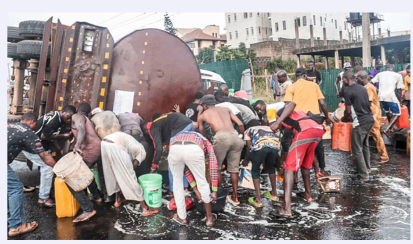The Federal Road Safety Corps (FRSC) has reported a grim tally of 411 fatalities linked to fuel scooping incidents in 2024, underscoring the perilous consequences of such acts across Nigeria.
Malam Shehu Mohammed, the FRSC Corps Marshal, disclosed this on Monday during a briefing on the agency’s 2024 special patrol operations in Abuja. He lamented the avoidable nature of these tragedies, calling for greater public awareness about the risks of fuel scooping.
“These deaths are entirely preventable,” Mohammed emphasized. “We must address the root causes—poverty, ignorance, and a disregard for safety regulations.”
A Year of Tragedy
Fuel scooping often occurs when tankers overturn, spilling their contents. Despite the evident dangers, many Nigerians, driven by economic hardship or opportunism, rush to collect the highly flammable substance.
Public reactions to the FRSC’s report revealed frustration and anger. “Scooping fuel is just asking to be barbequed,” lamented a commenter on a popular blog. Another wrote, “At no time would religion condone such reckless behavior. These tragedies are the result of ignorance and misplaced priorities.”
Experts argue that the lure of free fuel, compounded by the soaring cost of Premium Motor Spirit (PMS) following subsidy removal in 2023, has exacerbated this issue. A fuel scooping tragedy in Niger State earlier this month served as a chilling reminder of the persistent risks.
A Mixed Year for Road Safety
Beyond the harrowing death toll from fuel scooping, the FRSC also provided a broader analysis of road safety in 2024. The agency recorded 9,570 road traffic crashes (RTCs) nationwide, a 10% decrease from the 10,617 incidents reported in 2023. However, fatalities rose by 7%, with 5,421 deaths compared to 5,081 in the previous year.
Mohammed attributed the rise in fatalities to factors such as over-speeding, unsafe overtaking, and poor vehicle maintenance. He urged road users to exercise caution, particularly during the agency’s ongoing special patrol operations.
In terms of enforcement, the FRSC arrested 21,580 traffic offenders in 2024, a significant reduction from the 29,220 arrests made in 2023. This represents a 26% improvement in compliance with traffic laws.
Calls for Action
The persistent issue of fuel scooping deaths has sparked debates about the role of government and societal attitudes. Some critics argue that poverty and desperation drive many Nigerians to risk their lives for a few liters of fuel.
“APC has made PMS become gold,” wrote a commentator, referencing the skyrocketing cost of fuel under the current administration. Others pointed to the need for stricter enforcement of safety protocols around tanker accidents.
The FRSC has previously partnered with other agencies to educate the public about the dangers of fuel scooping. However, the practice persists, often with devastating results.
A Cautionary Tale
As the country grapples with economic challenges and rising fuel prices, the FRSC’s report serves as a stark reminder of the human cost of these issues. The agency’s Corps Marshal concluded his remarks with a plea for vigilance and responsibility. “These tragedies must not continue in 2025,” Mohammed said. “We cannot afford to lose more lives to preventable accidents.”

